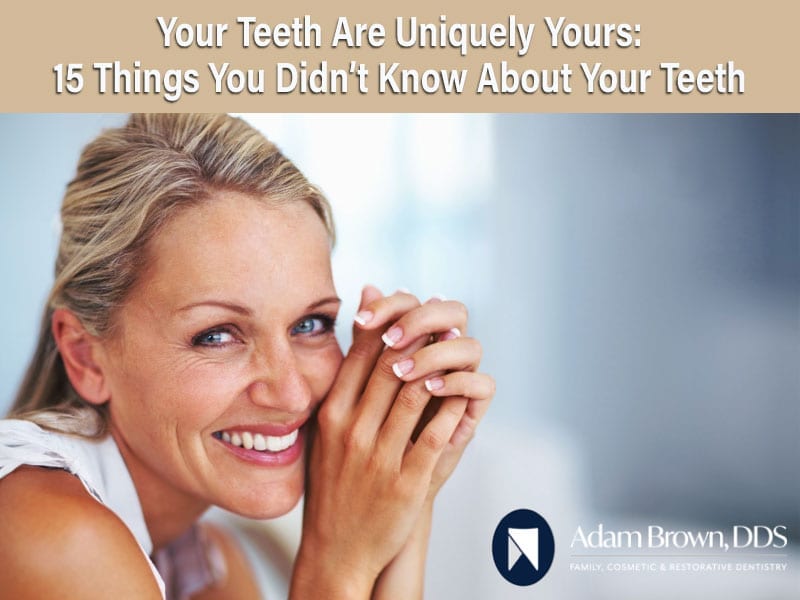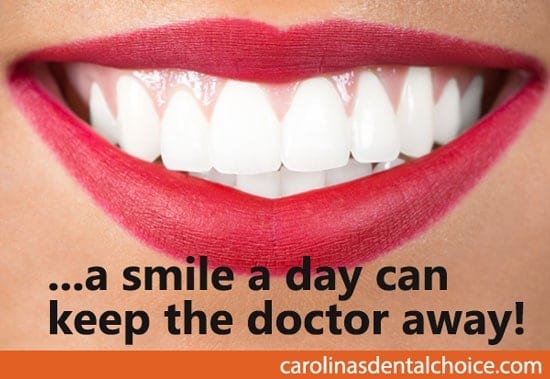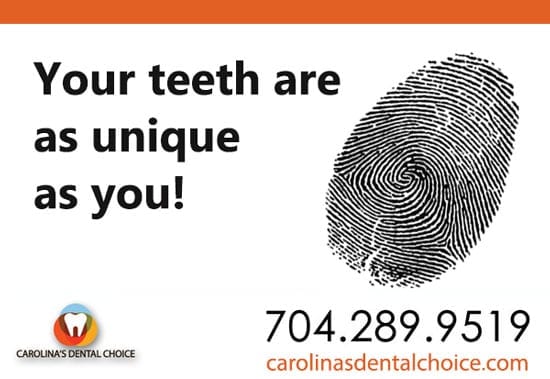
Your teeth: you learned how to brush them, you learned how to floss them, and you learned how to swish your mouth with fluoride. You went through the joy and pains of losing your baby teeth to gaining your permanent teeth, and possibly dealing with wisdom teeth. You know that your teeth are an essential part of your daily life, health, and confidence. Beyond all the things you already know about your teeth, Carolina’s Dental Choice wants to share some fun facts with you!
- Your mouth is home to 300 types of bacteria.
Before you worry about the high number of bacteria, know that most of the bacteria in your mouth are naturally occurring and actually work together to prevent decay. Bacteria can live on the gums, teeth, tongue and cheek. As for the bad bacteria living in your mouth, brushing and flossing your teeth keeps bad bacteria at bay.
- Not everyone has two sets of teeth.
Most people are born with two sets of teeth, the primary teeth (or as you may have called them, your baby teeth, that you lose) and permanent teeth. We lose baby teeth because a child’s mouth cannot hold 32 teeth, and the permanent teeth push them out. However, a small amount of people (2.5 to 6.9 percent of the population) did not have permanent teeth come in, and their baby teeth remain and become their permanent teeth.
- The hardest part of your body is enamel.
Enamel is the outer layer of all the teeth in your mouth. You may not have known that enamel is also the hardest part of your entire body! But, even as the hardest part of your body, it is also more brittle and is susceptible to breaking more easily. Yellowing teeth can be due to decaying enamel, and we can often become altered to decaying enamel from the pain it causes. Because enamel can’t repair itself, dentists can treat decaying enamel with tooth decay removal, sealants, fillings, and more. Ultimately, we want to protect our enamel and reverse any tooth decay with daily brushing, flossing, fluoride, and drinking more water.
- Not everyone needs their wisdom teeth taken out.
Although it’s hard to know exactly how many people actually have to get their wisdom teeth removed, it’s estimated that around 60-85% get their wisdom teeth taken out. Fun fact: as we evolve our jaw length is getting shorter and the wisdom teeth do not have enough room to come in. This causes a lot of us pain and requires us to have them surgically removed as they start to come in. On the other hand, some people are just lucky enough to be born without wisdom teeth!
- Teeth can grow in strange places.
It’s a rare case, but teratomas can cause tumors to have teeth. Yes, you read that correctly. Teratomas are tumors that contain developed tissue, which themselves contain teeth, hair, and bone. It forms in the fetus and is seldom cancerous, meaning teratomas can be removed and treated with little risk. While the condition can terrifyingly occur in anyone, teratomas are rare, and its very unlikely you have to worry about it.
- Teeth are the only structures in your body that can’t repair themselves.
If your teeth are chipped or lost, only a dentist can repair it. Unlike other parts of your body, like muscles and certain bones, your teeth are not alive and are not self-repairing structures. But there’s no need to fret over a chipped or lost tooth with the dentistry available today—they’ll have your smile looking better in no time!
- You can brighten your smile without braces.
We all want white, aligned, and shapely teeth, and veneers can be one way for us to achieve that! A veneer is a porcelain shell placed over the surface of your teeth. They not only brighten your smile, but can prevent further tooth damage and expensive treatments.
- Some teeth can be pretty expensive.
Many celebrities opt go to extreme lengths to perfect their smiles. We see that with the dazzling smiles of those like actor Tom Cruise, who spent $30,000 on dental work, and model Victoria Beckham, who spent over $40,000 total on her teeth. The most expensive singular tooth however, sold was that (reportedly) of the late John Lennon, which sold for $36,857 at an auction house in 2011.
- Your drinking water protects your teeth.
In 1945, Grand Rapids, Michigan was the first community to put fluoride in their water system, and now, two-thirds of U.S. population gets fluoride from their drinking water. While many people have concerns about fluorosis, a condition that causes white spots on the teeth from ingesting too much fluoride, the amount of fluoride in the drinking water is totally safe. Most cases of fluorosis are actually from kids under eight years old ingesting toothpaste, so be sure to monitor children as they perform their dental maintenance routines.
- Your teeth begin to develop at six weeks in utero.
As early as six weeks, your teeth begin to develop in the womb. You can actually tell a lot of about the mother and the environment she was in during the pregnancy term (think: nutrition, pollution, disease) by examining a baby’s teeth. A baby’s teeth do not begin to come in until they are between six to twelve months old.
- A toothbrush and floss aren’t the only weapons you have to protect your teeth.
We know it as the universal solvent, but we certainly don’t credit saliva enough as a natural defendant against dental plaque. Your toothbrush misses 35% of your tooth’s surfaces, so while flossing is very important, your saliva can also help break down any bad bacteria and plaque. We create a surprising amount of saliva, at 35,000 liters, in a lifetime—that’s enough to fill up two swimming pools!
- Your teeth can be an indicator of your overall health.
Oral health is an indicator of your overall health. Just as your teeth can affect other organs in your body, problems in the rest of your body can also manifest in your mouth. For example, flat teeth and headaches are an indicator of grinding teeth at night, which is caused by stress. Or, suspicious sores in the mouth that won’t go away can be also be a sign of oral cancer. From the mouth, we can find indicators of serious conditions like heart disease, diabetes, and stroke. It’s definitely important that you go to the dentist not only for your routine teeth cleaning, but also to get an idea of how your oral and overall health is doing.

- Your smile can make you feel better with the release of neurotransmitters.
It sounds silly, but a smile a day can keep the doctor away! Your smile can cause a release of endorphins and serotonin. Endorphins make us feel happy and lower our stress levels; as we smile and release of endorphins, we’re naturally boosting our mood. Serotonin, which as also released when you smile, is an anti-depressant and natural pain-reliever. Loving your smile can truly make you and those around you happier and healthier.
- Nervous habits can chip your chompers.
Not only does it ruin your nails and cuticles, but nail biting, a nervous and often unconscious tick, can actually cause major damage to your teeth. Constantly biting down on one part of your tooth can chip or fracture your tooth. Over time, nail biting can even lead to TMJ, a condition caused from excess stress and pain in the joint and muscles we use to chew. Luckily, by keeping your nails short or recognizing that you’re nail biting as a result of stress or boredom can encourage you to find other calming options.

- Your teeth are as unique as you!
Our teeth are unique—in fact, none of the 32 teeth in your mouth are the same. No two people have the same teeth either, not even identical twins. Just like our DNA inherently makes us unique, our genes can also impact our grin. If gapped teeth or missing teeth run in your family, you can also get dental abnormalities passed down from your parents. Because teeth are unique, they can also be used as identifiers. In forensic dentistry, we can study people’s teeth to see who they were, what they did, or used to identify human remains.
You can love your teeth and smile without knowing everything about them, but having a broader appreciation of your teeth makes them all the more impressive. While there are many ways to care for your unique teeth and overall oral health, if you want to talk about your smile with professionals that are eager to chat with you, contact Carolina’s Dental Choice today.
